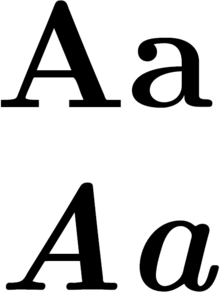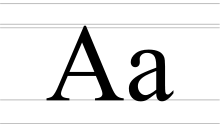Definify.com
Definition 2026
А
А
| ||||||
|---|---|---|---|---|---|---|
Translingual


Letter
А (upper case, lower case а)
- The first letter of several Cyrillic alphabets.
Related terms
- A (Latin alphabet)
See also
- Appendix:Alphabets#Cyrillic alphabets
- Entries in the English Wiktionary beginning with A (A)
- Wikipedia article on the Cyrillic alphabet
Bashkir

Pronunciation
Letter
А • (A) (lower case а)
- The first letter of the Bashkir alphabet
See also
- (Cyrillic script letters) хәреф (xäref); А (A) а (a), Б (B) б (b), В (V) в (v), Г (G) г (g), Ғ (Ğ) ғ (ğ), Д (D) д (d), Ҙ (Đ) ҙ (ð), Е (Ye) е (ye), Ё (Yo) ё (yo), Ж (Ž) ж (ž), З (Z) з (z), И (I) и (i), Й (Y) й (y), К (K) к (k), Ҡ (Q) ҡ (q), Л (L) л (l), М (M) м (m), Н (N) н (n), Ң (Ñ) ң (ñ), О (O) о (o), Ө (Ö) ө (ö), П (P) п (p), Р (R) р (r), С (S) с (s), Ҫ (Θ) ҫ (θ), Т (T) т (t), У (U) у (u), Ү (Ü) ү (ü), Х (X) х (x), Һ (H) һ (h), Ц (Ts) ц (ts), Ч (Č) ч (č), Ш (Š) ш (š), Щ (Šč) щ (šč), Ъ (ʺ) ъ (ʺ), Ы (Ï) ы (ï), Ь (’) ь (’), Э (E) э (e), Ә (Ä) ә (ä), Ю (Yu) ю (yu), Я (Ya) я (ya)
Russian
Letter
А • (A) (upper case, lower case а)
Usage notes
The Russian name for А (A) is а (ā), and in stressed syllables it has the sound of the long a in father. In unstressed positions, it is pronounced as a schwa, like the o in mother. (Unstressed Russian а (a) is pronounced the same as unstressed Russian о (o).)
а
а
| ||||||
|---|---|---|---|---|---|---|
Translingual


Letter
а (lower case, upper case А)
- The first letter of several Cyrillic alphabets.
Related terms
- a (Latin alphabet)
See also
- Appendix:Alphabets#Cyrillic alphabets
- Entries in the English Wiktionary beginning with а
- Wikipedia article on the Cyrillic alphabet
Adyghe
Alternative forms
- ӏа (ʾā)
Pronunciation
- IPA(key): [ʔaː]
Determiner
а • (ā)
- that, Calling article (o)
- а бэнанэ ― ā bănānă ― that banana
- а пшъашъэ ― ā pŝāŝă ― that girl
- а кӏалэм еӏуэ ― ā č̣̍ālăm eʾ°ă ― that boy is saying
Letter
а • (ā) (lower case, upper case А)
See also
- (Cyrillic script letters) А (Ā) а (ā), Б (B) б (b), В (V) в (v), Г (Γ) г (γ), Гу (G°) гу (g°), Гъ (Ġ) гъ (ġ), Гъу (Ġ°) гъу (ġ°), Д (D) д (d), Дж (Ǯ̍) дж (ǯ̍), Дз (Ʒ) дз (ʒ), Дзу (Ʒ°) дзу (ʒ°), Е (E) е (e), Ё (Ë) ё (ë), Ж (Ž) ж (ž), Жъ (Ẑ) жъ (ẑ), Жъу (Ẑ°) жъу (ẑ°), Жь (Ž̍) жь (ž̍), З (Z) з (z), И (I) и (i), Й (J) й (j), К (K) к (k), Ку (K°) ку (k°), Къ (Q) къ (q), Къу (Q°) къу (q°), Кӏ (Č̣̍) кӏ (č̣̍), Кӏу (Kʾ°) кӏу (ḳ°), Л (L) л (l), Лъ (Ł) лъ (ł), Лӏ (Ḷ) лӏ (ḷ), М (M) м (m), Н (N) н (n), О (O) о (o), П (P) п (p), Пӏ (Ṗ) пӏ (ṗ), Пӏу (Pʾ°) пӏу (ṗ°), Р (R) р (r), С (S) с (s), Т (T) т (t), Тӏ (Ṭ) тӏ (ṭ), Тӏу (Tʾ°) тӏу (ṭ°), У (W) у (w), Ф (F) ф (f), Х (X) х (x), Хъ (Χ) хъ (χ), Хъу (Χ°) хъу (χ°), Хь (Ḥ) хь (ḥ), Ц (C) ц (c), Цу (C°) цу (c°), Цӏ (C̣) цӏ (c̣), Ч (Č) ч (č), Чӏ (Č̣) чӏ (č̣), Чъ (Č) чъ (č), Ш (Š) ш (š), Шъ (Ŝ) шъ (ŝ), Шъу (Ŝ°) шъу (ŝ°), Шӏ (Ṣ̂) шӏ (ṣ̂), Шӏу (Šʾ°) шӏу (ṣ̂°), Щ (Š̍) щ (š̍), Ъ (”) ъ (”), Ы (Ə) ы (ə), Ь (’) ь (’), Э (Ă) э (ă), Ю (Ju) ю (ju), Я (Jā) я (jā), ӏ (ʾ), ӏу (ʾ°)
Bulgarian
Pronunciation 1
- IPA(key): /a/
Letter
а • (a) (lower case, upper case А)
See also
- (Cyrillic script letters) А (A) а (a), Б (B) б (b), В (V) в (v), Г (G) г (g), Д (D) д (d), Е (E) е (e), Ж (Ž) ж (ž), З (Z) з (z), И (I) и (i), Й (J) й (j), К (K) к (k), Л (L) л (l), М (M) м (m), Н (N) н (n), О (O) о (o), П (P) п (p), Р (R) р (r), С (S) с (s), Т (T) т (t), У (U) у (u), Ф (F) ф (f), Х (H) х (h), Ц (C) ц (c), Ч (Č) ч (č), Ш (Š) ш (š), Щ (Št) щ (št), Ъ (Ǎ) ъ (ǎ), Ь (ʹ) ь (ʹ), Ю (Ju) ю (ju), Я (Ja) я (ja)
Particle
а • (a)
- used in orders for emphasis: let’s, just
- А върви де! ― A vǎrvi de! ― Come on, go ahead!
- А да идем на кино. ― A da idem na kino. ― Let’s go to the pictures.
- А удари ме, ако смееш. ― A udari me, ako smeeš. ― Just you hit me, if you dare.
- Кажи де, а кажи! ― Kaži de, a kaži! ― Speak up, do!
- just, about to, on the point of, almost
- разперила криле, а-а да хвръкне ― razperila krile, a-a da hvrǎkne ― with wings spread out, about to fly off
Interjection
а • (a)
- used to express surprise or wonder: ah, oh, ha, why
- А, ето къде си бил! ― A, eto kǎde si bil! ― Ah, there you are!
- А, значи ти хареса. ― A, znači ti haresa. ― Oh, so you liked it.
- А! Не те видях. ― A! Ne te vidjah. ― Oh! I didn't see you there.
- А, Джейн, ти ли си! ― A, Džejn, ti li si! ― Why Jane, it's you!
- used to express pleasure, relief: ah
- А, пролетните цветя. ― A, proletnite cvetja. ― Ah, the flowers of spring.
- А, спомням си старите времена. ― A, spomnjam si starite vremena. ― Ah, I remember the good old days.
- used when you are not certain about something and you would like confirmation: eh, well, right, or translated with a tag question
- Хареса ти, а? ― Haresa ti, a? ― So, you liked it, eh/did you?
- Утре заминаваш, а? ― Utre zaminavaš, a? ― You're leaving tomorrow, right?
- (colloquial) used to indicate that one did not hear what was said: eh, huh
- ‘Не съм гладен.’ ‘А?’ ‘Казах, че не съм гладен.’ ― ‘Ne sǎm gladen.’ ‘A?’ ‘Kazah, če ne sǎm gladen.’ ― ‘I'm not hungry.’ ‘Eh?’ ‘I said I'm not hungry.’
- А? Какво каза? ― A? Kakvo kaza? ― Huh? What did you say?
- used to express understanding, recognition, or realization: oh
- А, значи така работело. ― A, znači taka rabotelo. ― Oh, so that's how it works.
- А, сега ми дойде на ум! ― A, sega mi dojde na um! ― Oh, I’ve just thought of it.
- А, да, сетих се! ― A, da, setih se! ― Oh, yes, I remember.
- used to express displeasure, objection
- Изпуснал влака … ама работа, а! ― Izpusnal vlaka … ama rabota, a! ― So he missed the train … what a damned nuisance!
- А, той ще ми каже! ― A, toj šte mi kaže! ― He's not the one to tell me!
- Ще ми се плезиш, а! ― Šte mi se pleziš, a! ― Don't stick out your tongue at me!
- used to express criticism or disapproval: now
- А-а, така не може! ― A-a, taka ne može! ― Now, this sort of thing can’t go on/won’t do!
- А, Били, така не се говори на майка си! ― A, Bili, taka ne se govori na majka si! ― Now, Billy, that's no way to talk to your mother!
Pronunciation 2
Conjunction
а • (a)
- used to describe how two facts are different: whereas, while
- Мислехме си, че е арогантна, а всъщност просто беше много срамежлива. ― Mislehme si, če e arogantna, a vsǎštnost prosto beše mnogo sramežliva. ― We thought she was arrogant, whereas in fact she was just very shy.
- Той има кафяви очи, а децата му имат зелени очи. ― Toj ima kafjavi oči, a decata mu imat zeleni oči. ― He has brown eyes whereas his children have green eyes.
- Едни се раждат, а други умират. ― Edni se raždat, a drugi umirat. ― Some are born while others die.
- used to introduce an idea that is different or opposite to the idea that is desired, expected or that you have stated previously: but, yet, rather
- Не музиката не харесвам, а самата банда. ― Ne muzikata ne haresvam, a samata banda. ― It's not the music I don't like but (rather) the band themselves.
- Тя получи повишението не заради късмет, а с усърдна работа. ― Tja poluči povišenieto ne zaradi kǎsmet, a s usǎrdna rabota. ― She got the promotion not by luck but by hard work.
- Стените не бяха бели, а по-скоро мръсно сиви. ― Stenite ne bjaha beli, a po-skoro mrǎsno sivi. ― The walls were not white, but rather a sort of dirty grey.
- Той има добра работа, а като че ли никога няма пари. ― Toj ima dobra rabota, a kato če li nikoga njama pari. ― He has a good job, and yet he never seems to have any money.
- Мислех си, че те познавам, а колко съм грешал. ― Misleh si, če te poznavam, a kolko sǎm grešal. ― I thought I knew you, yet how wrong I was.
- Видях го вчера, а не днес. ― Vidjah go včera, a ne dnes. ― I saw him yesterday, not today.
- used to start a new sentence or clause that continues or adds to a previous sentence or clause: and
- Минаха години и всичко се промени. А той все още не се завръщаше. ― Minaha godini i vsičko se promeni. A toj vse ošte ne se zavrǎštaše. ― Years passed and everything changed. And he still hadn't come back.
Synonyms
See also
- а... а... (a... a...)
Macedonian
Etymology
From Proto-Slavic *a.
Conjunction
а • (a)
Particle
а • (a)
- what about
- А јас? ― A jas? ― What about me?
Nivkh
Letter
а (transliteration needed) (upper case А)
- The first letter of the Nivkh alphabet.
See also
- (Cyrillic script letters) Аа, Бб, Вв, Гг, Ӷӷ, Ғғ, Ӻӻ, Дд, Ее, Ёё, Жж, Зз, Ии, Йй, Кк, К’к’, Ӄӄ, Ӄ’ӄ’, Лл, Мм, Нн, Ӈӈ, Оо, Пп, П’п’, Рр, Р̌р̌, Сс, Тт, Т’т’, Уу, Фф, Хх, Ӽӽ, Ӿӿ, Цц, Чч, Ч’ч’, Шш, Щщ, Ъъ, Ыы, Ьь, Ээ, Юю, Яя
Old Novgorodian
Etymology
From Proto-Slavic *a.
Conjunction
а (a)
References
- J. Schaeken et al. Birchbark Literacy from Medieval Rus: Contents and Contexts (INTAS-Project Ref. Nr. 03-51-3867).
Ossetian
Pronunciation
- (phoneme) IPA(key): /a/
Letter
а • (a) (upper case А)
- The first letter of the Ossetian alphabet.
See also
- (Cyrillic script letters) А (A) а (a), Ӕ (Æ) ӕ (æ), Б (B) б (b), В (V) в (v), Г (G) г (g), Гъ (Ǧ) гъ (ǧ), Д (D) д (d), Дж (Ǵ) дж (ǵ), Дз (Ʒ) дз (ʒ), Е (E) е (e), З (Z) з (z), И (I) и (i), Й (J) й (j), К (K) к (k), Къ (K’) къ (k’), Л (L) л (l), М (M) м (m), Н (N) н (n), О (O) о (o), П (P) п (p), Пъ (P’) пъ (p’), Р (R) р (r), С (S) с (s), Т (T) т (t), Тъ (Tʺ) тъ (t’), У (U) у (u), Ф (F) ф (f), Х (X) х (x), Хъ (Q) хъ (q), Ц (C) ц (c), Цъ (C’) цъ (c’), Ч (Ḱ) ч (ḱ), Чъ (Ḱ’) чъ (ḱ’), Ы (Y) ы (y)
Russian
Etymology 1
See Translingual section.
Pronunciation
- IPA(key): [a]
Letter
а • (a) (lower case, upper case А)
- The first letter of the Russian Cyrillic alphabet. It is followed by the letter б (b).
- The name of the Roman letter A, a in Russian.
Usage notes
The Russian name for а (a) is а (ā), and in stressed syllables it has the sound of the long a in father. In unstressed positions, it is pronounced as a schwa, like the o in mother. (Unstressed Russian а (a) is pronounced the same as unstressed Russian о (o).)
Etymology 2
From Proto-Slavic *a (“and, but”), from Proto-Balto-Slavic *ō, from Proto-Indo-European *h₁ōd (presumed to be the ablative of *éy, h₁e). Cognate with Lithuanian õ (“and, but”).
Possible link with Lithuanian ar̃ (“question particle”). Compare Russian а (a, “and, but”), и (i, “and”) and да (da, “and, but”) with Lithuanian ar̃ (“if, whether”), ir̃ (“and”) and dár (“still, yet”).
Pronunciation
Conjunction
а • (a)
See also
Etymology 3
Compare Lithuanian à, õ, oà (“expression of pain, surprise”), as well as Gothic 𐍉 (ō, “ah!”), Latin ā, āh (“expression of pain, anger”), Ancient Greek ἆ (â, “ah!”)
Alternative forms
Pronunciation
- IPA(key): [a]
Interjection
а • (a)!
- well! (expressing surprise)
Particle
а • (a)
- (colloquial particle used to seek confirmation) eh
- Ты слы́шишь меня́, а? ― Ty slýšišʹ menjá, a? ― Do you hear me, eh?
- Ты придёшь сего́дня, а? ― Ty pridjóšʹ sevódnja, a? ― So are you coming today, then?
Etymology 4
Abbreviation of ампе́р (ampér).
Pronunciation
- IPA(key): [ɐm⁽ʲ⁾ˈpʲer] (phonetic respelling: ампе́р)
Noun
а • (a) m inan (indeclinable)
Etymology 5
Pronunciation
- IPA(key): [a]
Pronoun
а • (a) (invariable)
References
- Viktor Pirožkov (2001), Kriminalʹnaja Psixologija [Criminal Psychology], Moscow: Os-89
Serbo-Croatian
Pronunciation
- IPA(key): /a/
Etymology 1
See Translingual section.
Alternative forms
- (uppercase): А
Letter
а (Latin spelling a)
See also
- (Cyrillic script letters) Аа, Бб, Вв, Гг, Дд, Ђђ, Ее, Жж, Зз, Ии, Јј, Кк, Лл, Љљ, Мм, Нн, Њњ, Оо, Пп, Рр, Сс, Тт, Ћћ, Уу, Фф, Хх, Цц, Чч, Џџ, Шш
Etymology 2
From Proto-Slavic *a (“and, but”), from Proto-Balto-Slavic *ō.
Conjunction
а (Latin spelling a)
- but, and (compare а̏ли)
- учио сам ц(иј)ело посл(иј)еподне, а ништа нисам научио ― I studied for the whole afternoon, but I didn't learn anything
- а како бисте ви то направили? ― and how would you do that?
- while (on the contrary), whereas
- столови су црвени, а столице су зелене ― the tables are red, whereas the chairs are green
- (with да не) without (usually after negative verbs)
- не могу се укључити у расправу, а да не направим неред ― I cannot enter a discussion without making a mess
- одлази, а да није рекао ни збогом ― he's leaving without even saying goodbye
- (а и̏па̄к) and yet
- прави пријатељ зна све о теби, а ипак те воли ― the real friend knows everything about you, and yet he loves you
- (а ка̏моли) not to mention, let alone
- у мору лоших в(иј)ести тешко је остати објективан, а камоли оптимистичан ― in the sea of bad news it's hard to stay objective, let alone optimistic
- (а + и + да) even if
- а и да јесам то направио, не би то учинило неку разлику ― even if I did it, it wouldn't have made much of a difference
- (а + и) and so, and also, and too
- свиђају ми се плавуше, а и ја се покојој свидим ― I like blondes, and some of them even like me
- били су жалосни, а и ја сам ― they were sad, and so am I
Etymology 3
Attested since the 15th century. Probably of onomatopoeic origin. Compare Slovene a, Russian а (a), Lithuanian õ, Latin ō and Ancient Greek ὦ (ô). These could all derive from Proto-Indo-European interjection ō (“oh, ah”), but each form in individual languages could easily be an independent, expressive formation.
Interjection
а (Latin spelling a)
References
- “а” in Hrvatski jezični portal
- “а” in Hrvatski jezični portal
- Skok, Petar (1971) Etimologijski rječnik hrvatskoga ili srpskoga jezika (in Serbo-Croatian), volume 1, Zagreb: JAZU, page 1
Ukrainian
Etymology
See Translingual section.
Pronunciation
- IPA(key): [ˈɑ]
Letter
а • (a) (lower case, upper case А)
See also
- (Cyrillic script letters) А (A) а (a), Б (B) б (b), В (V) в (v), Г (H) г (h), Ґ (G) ґ (g), Д (D) д (d), Е (E) е (e), Є (Je) є (je), Ж (Ž) ж (ž), З (Z) з (z), И (Y) и (y), І (I) і (i), Ї (Ji) ї (ji), Й (J) й (j), К (K) к (k), Л (L) л (l), М (M) м (m), Н (N) н (n), О (O) о (o), П (P) п (p), Р (R) р (r), С (S) с (s), Т (T) т (t), У (U) у (u), Ф (F) ф (f), Х (X) х (x), Ц (C) ц (c), Ч (Č) ч (č), Ш (Š) ш (š), Щ (Šč) щ (šč), Ь (ʹ) ь (ʹ), Ю (Ju) ю (ju), Я (Ja) я (ja)
Conjunction
а • (a)
Particle
а • (a)
- interrogative particle: introduces a question
Interjection
а • (a)!
